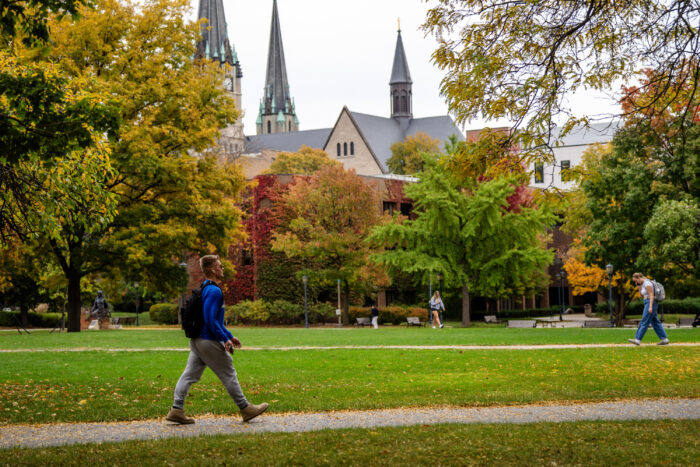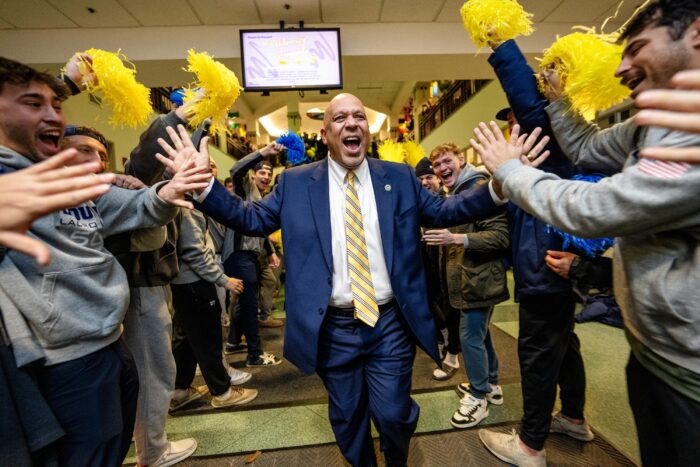Marquette University affirms that diversity, inclusion and equity are central to fulfilling our Catholic, Jesuit mission and to institutional effectiveness, excellence and sustainability. Organizational growth is best achieved through direct feedback from its community members. To that end, Marquette in early 2020 conducted a climate study to better understand how the university climate contributes to one’s ability to learn, teach, work and enjoy an affirming quality of life. Like all organizations, Marquette faces challenges and opportunities, and this survey expresses our desire not to turn away from adversity but to continually discern how we address them with care and purpose.
The study was launched to track progress toward goals identified in the university’s last climate study in 2015: strengthen campus commitment to education and training, promote affinity groups and networks, and revise strategies to increase faculty and student diversity.
A climate survey was made available to students, faculty and staff from Feb. 10 to March 6, 2020, notably, prior to the combined impacts of the COVID-19 pandemic and a nationwide call to address racial and social justice issues this past summer. The 2020 climate survey sample included 3,414 Marquette community members, for an overall response rate of 24%. Response rates by constituent group varied: 53% for staff, 36% for faculty, 15% for graduate students and 20% for undergraduate students.
Following is a selection of key takeaways from the 2020 study. The Climate Study results and dashboards are available online. An accessible executive summary and full report will be made available soon.
- Results of the survey indicate a high level of comfort with the campus climate across the overall populations of students (74%), staff (72%) and faculty (66%). These results are similar to those reported in the 2015 survey.
- A concerning gap of comfort persists between white students, faculty and staff (78% comfortable or very comfortable) and students, faculty and staff of color (61%), with the clearest difference between white undergraduates (83%) and undergraduate students of color (60%).
- Nearly one in four respondents (23.7%) indicated they had experienced exclusionary, intimidating, offensive or hostile conduct in the previous year. Consistent with the 2015 survey, the most common ways in which respondents experienced this conduct were feeling disrespected, feeling isolated or believing themselves to be targets of hostile behavior.
- Consistent with the 2015 study, 11% of undergraduate students, 5% of graduate students and 2% of employees indicated having experienced unwanted sexual contact during their time at Marquette. Undergraduates who have experienced unwanted sexual contact reported that they were more likely to have those experiences in their first two semesters.
- Overall, students reported satisfaction with their academic experience at Marquette. Few students, regardless of social identity, said that they considered transferring to another institution for academic reasons.
- Seventy percent of staff and 64% of faculty agreed that they had adequate support (administrative staff, resources, etc.) to complete their assigned duties.
- Fifty-three percent of staff, 51% of faculty, 26% of graduate student and 41% of undergraduate student participants indicated that they had at some point seriously considered leaving Marquette.
According to the 2020 report, “Results suggest that more attention should be given to patterns in the perceptions among demographic groups and social identities within the university community that are having different experiences.”
Based on a recommendation from Vice President of Inclusive Excellence Dr. William Welburn, the President’s Cabinet is strongly encouraging unit-level planning processes that respond to the 2020 Campus Climate Study. Deans, vice presidents and vice provosts are encouraged to lead conversations about the 2020 data at the office, department, division and/or school/college level in spring-summer 2021, and for these data and conversations to inform ongoing strategic planning processes.
Progress toward improving the campus climate since the initial climate study in 2015 include, but are not limited to:
- Restructured strategies to increase student and employee diversity, including:
- Admissions initiatives
- Inclusive hiring practices workshops for search committees, including adoption of a provost’s policy on hiring and selection processes and increased opportunities for training on inclusive hiring practices
- “Power of Inclusion” session in Leadership Development Program
- Creation of the Institute for Women’s Leadership and Women’s Innovation Network by the Office of Research and Innovation
- Cluster hiring initiative to support the Race, Ethnic, and Indigenous Studies program
- Created programs to help increase employee training and development, including:
- Leadership Development Program for supervisors
- Department chair training
- Implicit bias training initiatives for employees
- Unlearning Racism series
- First-year faculty orientation
- Strengthened communication with enhanced diversity on the university website
- Increased support for students through the Center for Engagement and Inclusion and support for multicultural student organizations.
- Increased support for our Black students through:
- Improving diversity of counselors in Counseling Center. The university hired a counselor and coordinator for African American and Black student support at the Counseling Center and will hire additional counselors of color in the future.
- New scholarships. Beginning in fall 2021, Marquette will offer 40 full-tuition, four-year scholarships (five years, if needed) annually to qualified graduating seniors from high schools located in the City of Milwaukee.
- A new Director for Black Student Initiatives position. This person will be a member of the team in the Office of Institutional Diversity and Inclusion, who will be responsible for tracking progress of initiatives and programs aimed at increasing recruitment and retention of Black students and improving the campus climate.
- A new Black Cultural Center, which opened in January 2021 in Humphrey Hall.
- The development of a Committee for Black Student Initiatives chaired by Dr. Joya Crear, assistant vice president of student affairs.
- A new living-learning community, which will open in fall 2021 for at least 20 students.
- Advanced toward being a federally recognized Hispanic-Serving Institution, which recognizes universities that enroll a significant proportion of low-income students and have 25% of their full-time undergraduate student body be Hispanic.
- Formed eight Employee Resource Groups:
- Hispanic/Latinx Faculty and Staff Association
- LGBTQ+ Employee Resource Group
- Marquette Black Faculty and Staff Network
- Marquette Moms
- Marquette Social Professionals
- Sustainable Marquette Employee Resource Group
- Womxn of Color Employee Resource Group
- Women of Marquette Employee Resource Group
Watch Marquette Today for updates on actions taken as a result of the 2020 Climate Study findings.


